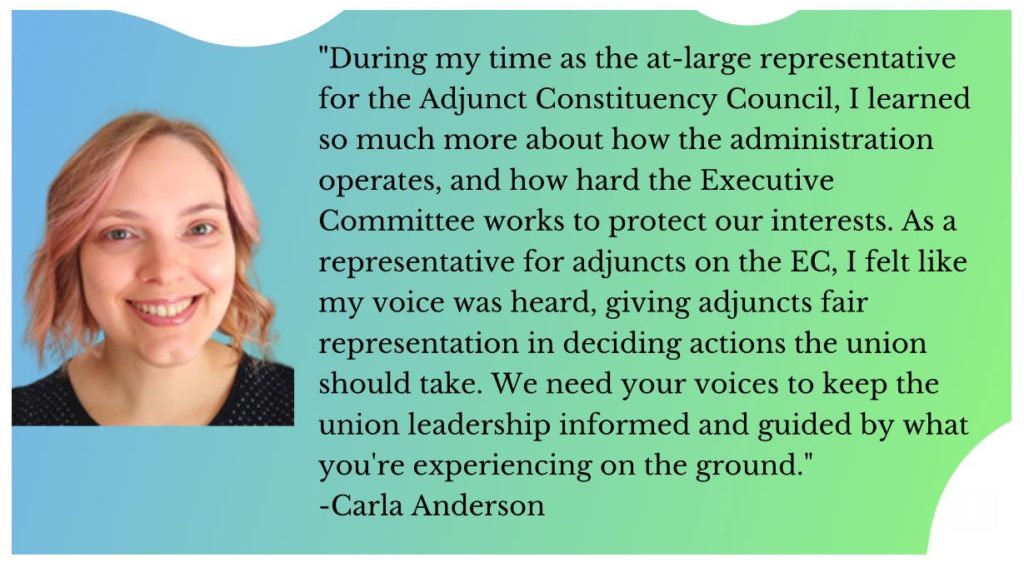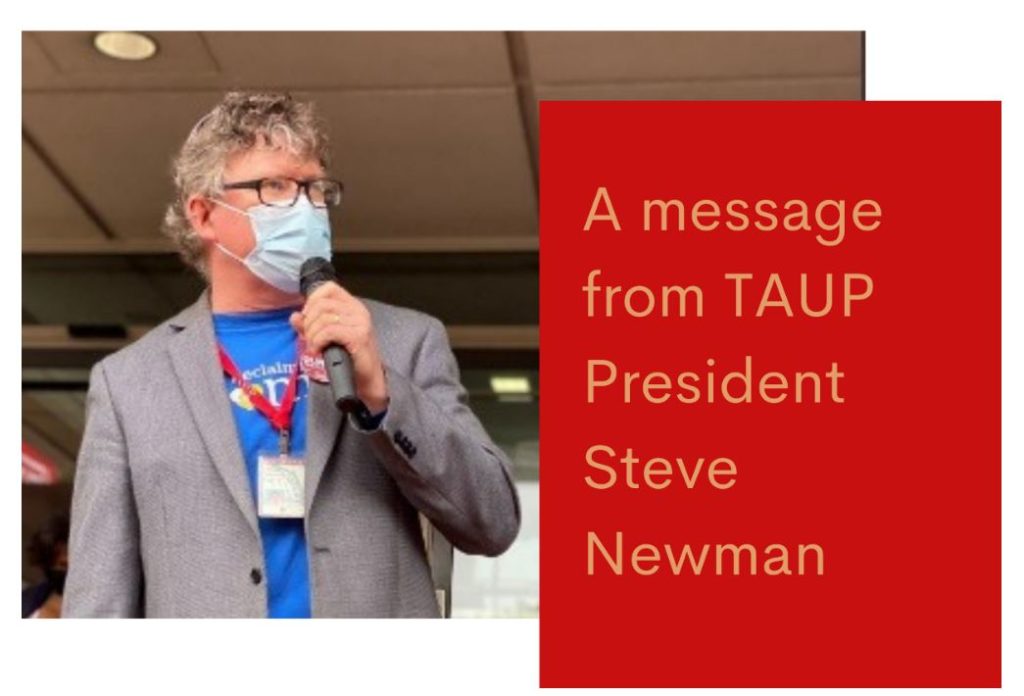The American Rescue Plan Act of 2021 signed by the President last Thursday is an extensive document that will assist schools, our students, their families, neighbors and businesses in the community surrounding TU campuses, alums, and most (if not all) of us.
There are significant provisions highlighted below that members of the TAUP bargaining unit should be aware of. You can search for further details in the Act’s full text and see a summary of all of the provisions here.
State Funding
“The bill requires each state receiving K-12 funds to maintain spending in fiscal year 2022 and 2023 on higher education, at least at the proportionate levels of the state’s spending on those categories relative to the state’s overall spending, averaged over fiscal years 2017, 2018, and 2019.” The American Association of Public and Land Grant Universities Analysis of the ARPA 2021
Funds for Institutions of Higher Ed and Students
This chart compares funding from past relief acts to the American Rescue Plan Act and clarifies how funds are to be spent.
Temple should be receiving about $78M from the ARPA
-
- Half of the funds will go directly to students
- The other half can be used to defray expenses associated with coronavirus including:
- Payroll, including re-hiring furloughed and laid off employees
- Reimbursement for expenses already incurred
- Technology costs associated with a transition to distance education
- Faculty and staff trainings
- Lost revenue
- Make additional financial aid grants to students
- Institutions must use a portion of their allocation for:
- Implementing evidence-based practices to monitor and suppress coronavirus in accordance with public health guidelines; and
- Conduct direct outreach to financial aid applicants about the opportunity to receive a financial aid adjustment due to the recent unemployment of a family member or independent student, or other circumstances
Funding for Research and Creative Work
The National Science Foundation, National Institute of Standards and Technology, National Endowment for the Arts, National Endowment for the Humanities and the Institute of Museum and LIbrary Services are among a number of organizations where funding has been increased and the usual spending timelines for the use of these funds have been extended.
Stimulus Payments
Cutting to the chase: you can calculate your stimulus payment here. The ARPA’s stimulus includes dependents regardless of their age.
Student Loan Forgiveness Support
The ARPA provides additional tax relief for those who have their student loans forgiven between December 31, 2020 and January 1, 2026.
When certain student loans are forgiven, the “forgiven” sum may be added to the individual’s gross income for that year, creating an extraordinary tax burden. The ARPA removes that tax for loans forgiven within the stated five year period. All federal student loans, and certain private education and institutional loans, will be eligible.
Changes in Eligibility and Premiums for Obamacare and Help with COBRA
If your health insurance is provided through the ACA (Obamacare), your premium rates will decrease due to ARPA’s increased subsidies detailed here. The changes are retroactive to January 1, 2021, so those who are already enrolled should receive compensation for their 2021 payments.
You can calculate what your premium would be under the current plan here.
To sign up or to change your plan, go to Healthcare.gov. Even if you earned too much to qualify in the past, you may qualify now.
For individuals who will lose work and want to maintain their current health plan between April 1st and September 30th of 2021, employers or insurers must cover 6 months of COBRA benefits and will receive a tax credit to offset the costs. More info here.
Child Tax Credit
The expanded Child Tax Credit will reduce child poverty in the U.S. by more than 40% and will be available to most people who need help to pay for the care of children under 13 or other dependents. You can calculate your tax credit here.
The credit for the first six months of the year will be applied to income taxes at the end of the year. In July, checks will be sent monthly. Credits range from $500 to $3600 per child depending on their age, and the credit begins to decrease for those with incomes above $112,500. More helpful information here.
Child and Dependent Care Tax Credit
To help people work, the Child and Dependent Care Credit can offer 50% of up to $8,000 in caregiving expenses and up to $16,000 for the care of two or more dependents. Certain family members do not qualify as caregivers for the credit. Child care is for children under 13 and dependent care must be for a dependent who has lived with you for more than six months and is physically or mentally incapable of self-care. More info here.
Dependent Care Reimbursement Accounts
ARPA offers an increase from $5000 to $10,500 as the maximum amount that can be contributed on a tax-free basis to a Dependent Care Reimbursement/Flexible Spending Account. For married individuals filing separately, the increase is from $2,500 to $5,250. Follow the link for Information on Temple’s Dependent Care/Flexible Spending Account Benefit.
Unemployment
The ARPA extends Unemployment Insurance (UI) benefits and programs.
In the past year, the PEUC benefit (Pandemic Emergency Unemployment Compensation) extended UI benefits for those who had exhausted their initial claim. With the ARPA, individuals may now receive up to 79 weeks of benefits.
The new PUA (Pandemic Unemployment Assistance) program for self-employed individuals, gig workers and others who have not qualified for assistance in the past will be extended from 50 to 79 weeks, until September 6th.
Federal Pandemic Unemployment Compensation (FPUC) has been the federal government’s weekly unemployment supplement. It will continue to be $300 per week until September 6th.
Individuals who have received Unemployment in 2020 will not have to pay taxes on $10,200 of the funds received. Couples who file joint returns can each receive this benefit if they have been on UI. Those with an adjusted joint income above $150,000 will not qualify for this tax benefit.
For Veterans and Members of the Military Interested in Higher Ed
The Act closes what is known as the 90/10 loophole. It pertains to for-profit institutions who are obliged to show their viability as businesses by earning at least 10% of their revenue sources outside of student aid.
Since GI benefits were not considered to be student aid, for-profits have been generating their 10% through aggressive recruiting of veterans and individuals currently serving in the military. Closing this loophole will protect servicemembers and veterans from predatory admissions. It will be implemented starting January 1, 2023





